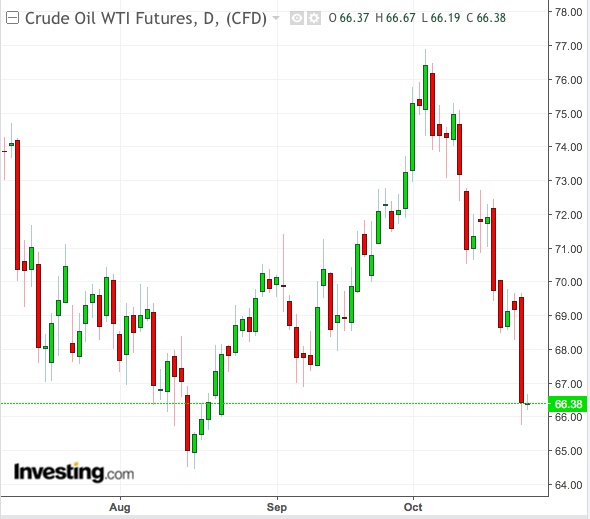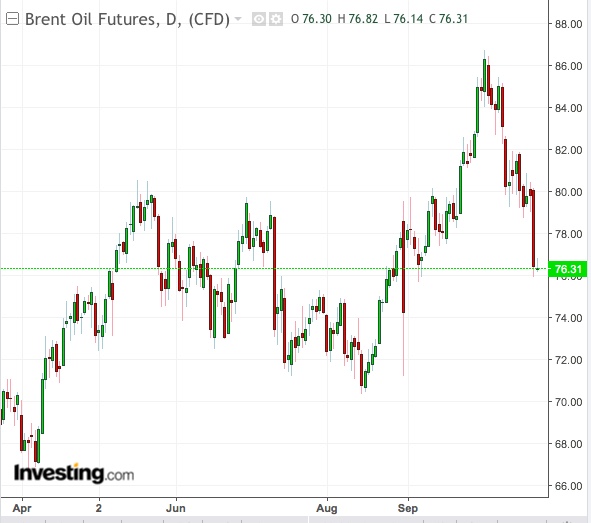When it comes to oil, the Saudi Energy Minister usually has the last word. This was proven right on Tuesday when Khalid al-Falih, who has presided over Saudi Arabia’s Energy Ministry for the last three and a half years, pledged the Kingdom will pump as much crude as necessary to ensure a minimum supply squeeze when US sanctions on Iranian oil exports begin in 11 days.
Saudi Arabia might end up cranking out between 1 and 2 million barrels per day above current production, Falih added for detail. That would account for between one and three quarters of the 2.71 million bpd produced daily by Iran at its peak in May. If the extra Saudi barrels come as promised, and Russian and US production also rise as expected, then the impact of the Iranian sanctions on oil-consuming nations might be a lot more manageable, or even barely palpable.
Biggest Oil Selloff In 3 Months
So good was the Saudi minister’s word on the production boost that it drove crude prices down nearly 5 percent on the day, culminating in the biggest one-day selloff in three months— perhaps not what he intended, given that low crude prices don’t really benefit an oil producer such as Saudi Arabia.

But the potency of Falih’s soundbites on oil was also evident in September when he publicly rebuffed President Donald Trump’s calls on Saudi Arabia to raise output to temper oil prices, which were hovering at four-year highs. Trump at that time accused the Saudi-led oil producing group OPEC of "ripping off the rest of the world" by making pump prices expensive in the run-up to the US mid-term elections in November.
While media reports in the days after Trump’s outburst said the Saudis and Russians did have a private deal to raise production and cool the rally in oil, Falih’s public response to the president was: “I do not influence prices.” Contrary to what he said, oil prices jumped 3 percent during the next trading session on his remarks.
It Wasn’t Always Like This
There were, however, also times when the Saudi Energy Minister didn't have the last word on oil. Falih, particularly, had difficulty in getting the market to accept his narrative on crude during his early days in office in 2015, when prices were crashing almost daily from a global glut in supply. At its height, the oil price crisis of 2014-2017 erased 75 percent of the market’s value, also casting a pall on the illustrious career of Falih’s predecessor Ali Al-Naimi, who prior to that had a near indomitable 30-year run as Saudi Energy Minister.
Historically as well, the Saudi-initiated 1973 Oil Embargo had mixed results for the Kingdom and OPEC. This resulted in Falih promising on Tuesday not to revert to such action but rather play a more responsible role as the world’s top oil exporter.
Which brings us to his current pledge and the contrary effect it will have on Saudi Arabia’s expressed desire to have stable oil prices at $70 to $80 per barrel.
WTI Could Break Below $60, Brent Under $70
If technical chartists are right, US West Texas Intermediate (WTI) crude will likely break the critically-important $65 per barrel support and then tumble toward $60 or even lower. Similarly, Brent, the global benchmark for oil, could break its $75 support and head toward $70 or lower. WTI last traded below $60 in March while Brent’s previous reign under $70 was in April. While both benchmarks showed a near 30 percent annual gain last month, the selloff over the past two weeks has halved that.

Technicals aside, four weeks of outsize stockpile builds—and counting—have left US crude storage with an unexpected surplus of more than 22 million barrels that are also weighing on prices.
And Falih’s assurances of more supply—an antidote to the fear factor built around the Iranian sanctions and oil’s early rally this year—may continue in his bid to endear the Kingdom to the world after the global ire it earned over the murder of journalist Jamal Khashoggi.
Saudi Arabia: A Nation 'In Crisis'
Saudi Arabia was a nation 'in crisis' after the 'abhorrent' killing of Khashoggi, Falih said on Tuesday before launching into details of how the world’s top crude exporter, which already pumps more than 10 million barrels per day, would help out with additional supply.
The unusual predicament of the Saudi energy minister wasn’t lost on oil traders on Tuesday.
John Kilduff, partner at New York energy hedge fund Again Capital, said:
“They want to be seen as the Steady Eddie of the market and they’re overcompensating supply to distract attention from the Khashoggi matter. That can’t be good for prices.”
Dominick Chirichella of the Energy Management of Institute in New York said he decided to maintain a cautious outlook on oil in the short-term, partly because of the “bearish overtone coming from the Saudi comments about production increases.”
The market, meanwhile, awaits Falih's next word on oil.
